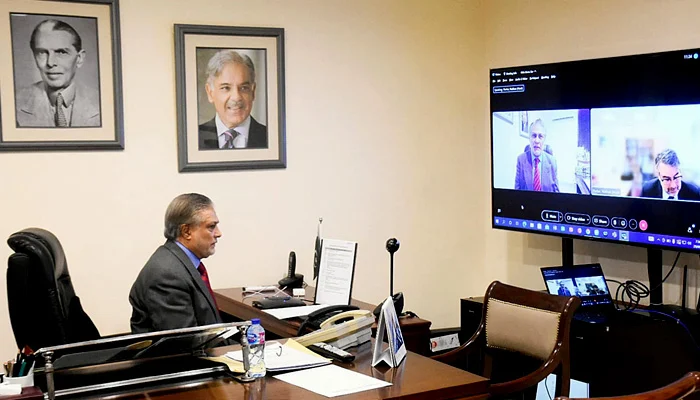- Ishaq Dar to attend IMF/World Bank meetings from Oct 10 to 16.
- Pakistan to formally request IMF to give concessions on loan conditions.
- IMF says policy commitments made by Pakistan to continue to apply.
Amid controversy over the new petrol price announced by the government which has been termed a “reckless” decision, Finance Minister Ishaq Dar will travel to Washington next week and hold meetings with the International Monetary Fund (IMF), seeking to revise the macroeconomic framework.
“Pakistan’s Minister for Finance Ishaq Dar will participate in the upcoming annual meeting of the IMF/WB,” a top official of the Finance Ministry confirmed while talking to The News on Wednesday.
In a surprise move last week, the federal government slashed the prices of petroleum products sparking debate about whether the move is in line with the IMF deal and former minister Miftah Ismail termed it a “reckless” move.
However, Dar responded to his predecessor by saying he knows how to deal with the IMF while state minister for finance Aisha Ghous Pasha added that the announcement didn’t violate the loan agreement.
The IMF had also said that policy commitments made by the Pakistani authorities as part of the seventh and eighth reviews under their support program continue to apply.
The publication, quoting unnamed sources, said that Pakistan will make a formal request to the IMF high-ups for revising the macroeconomic framework for the current fiscal year 2022-23 by lowering the GDP growth rate, hiking inflation and upward adjustments of twin deficits known as the budget deficit and current account deficit.
Islamabad is all set to make a request to the IMF for making the conditions attached to the Extended Fund Facility (EFF) lenient, especially freezing fuel price adjustment of electricity and petroleum development levy on POL products for the next few months to provide some relief to the inflation-stricken masses.
Pakistan, the report said, will also request to relax the budget deficit target for the current fiscal year as severe floods might damage its revenue mobilisation efforts and increase pressures on the expenditure front.
The government has restricted the budget deficit target at 4.9% for the current fiscal year under the IMF programme and throwing a revenue surplus of Rs153 billion till the end of June 2023.
The request for revising the macroeconomic framework will be made for the current fiscal year in the wake of severe floods that have caused devastation and required construction costs of over $30 billion for the struggling economy of Pakistan.
As per the report, Secretary Economic Affairs Division Kazim Niaz had already departed Islamabad for Washington to attend the upcoming meetings of Breton Wood Institutions.
Under the macroeconomic framework, the government has assessed that the country’s GDP growth might hover around 2% for the current fiscal year against the initially envisaged target of 5%.
The economic loss has been estimated at Rs2.4 trillion for the current fiscal year. The government’s projections also show that unemployment projection will increase due to the loss of 1.8 to 2 million jobs and poverty may hike by 4.5 to 5%, implying that 9 to 12 million people will fall below the poverty line.
The agriculture growth is feared to remain negative in the range of -0.7% to -2.1% against the target of plus 3.9% for the current fiscal year. The government has estimated that the growth in major crops was expected to remain negative in the range of 14 to 15.4% for the current fiscal year. Around one million large and small animals have perished. The livestock growth is expected to remain between 2 to 3% against the desired target of 3.7 % for the current fiscal year.
The inflation will hike, to go up in the range of 23 to 25% for the current fiscal year against the initially envisaged target of 11.5%.
The government has not yet firmed up any specific number for the current account deficit but it is feared that it may go up from $9 billion to $12 billion for the ongoing financial year mainly because of decline in exports.

 Latest News5 hours ago
Latest News5 hours ago
 Business5 hours ago
Business5 hours ago
 Latest News5 hours ago
Latest News5 hours ago
 Entertainment5 hours ago
Entertainment5 hours ago
 Latest News5 hours ago
Latest News5 hours ago
 Uncategorized31 minutes ago
Uncategorized31 minutes ago
























